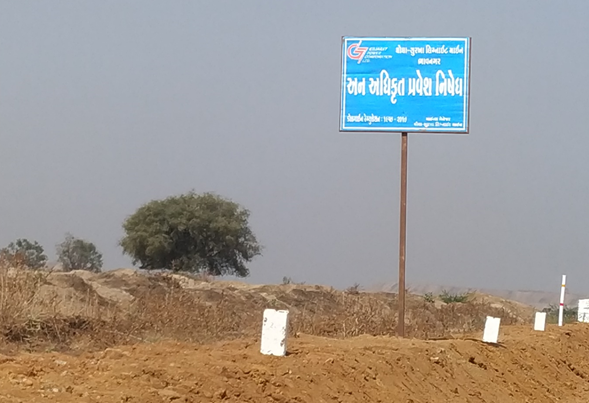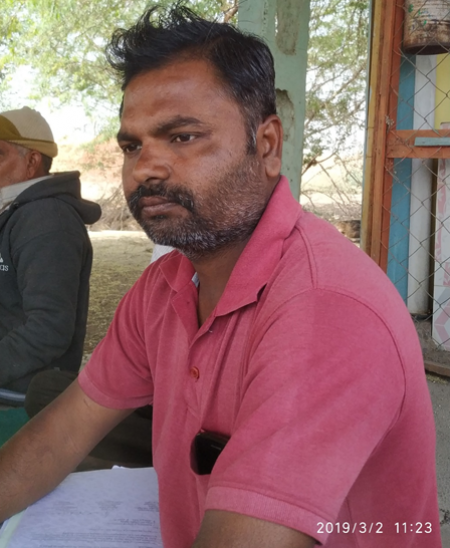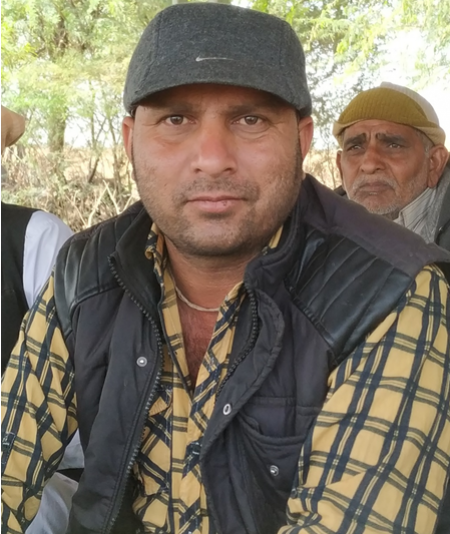Gujarat Farmers Barred From Entering Own Land as GPCL Mines Lignite Under Police Protection

Board at the land of a farmer in Badi says "no entry without permission"
Vasudev Gohil, a farmer from Badi village of Ghogha taluka in Bhavnagar district has not had any income since April 2018. Gohil and his three brothers once owned six hectares of land that sustained a family of 18. On April 2, 2018, Gujarat government acquired about 200 hectares of land in Badi and Thordi villages of Ghogha, Bhavnagar. Gohil was one of the 170 farmers to lose land that day.
“On April 1 last year, about 3,000 police personnel rounded up the protesting farmers, lobbed tear gas, lathi charged, and detained about 100, farmers who were identified as the ones leading the protest. In the evening, the deputy collector and police officer of inspector general rank visited the farmers who were not detained. The two of them assured that they will come back with the contractor of the company and initiate talks with us the next day. When all the farmers had left for their homes, late in the night, the government acquired about 200 hectares of land in Badi and Thordi villages, and planted the mining equipment,” Vasudev Gohil told Newsclick.

Vasudev Gohil, one of the farmers who have lost land
“Neither the collector, police officer nor the contractor have come to meet the farmers since then. Mining began in May 2018 under police protection,” he added.
Notably, between 1993 and 1994, 3,377 acres of land from 12 villages of Ghogha taluka in Bhavnagar was acquired by the Gujarat government. The land that included farm land, grazing land and waste land, apart from agricultural land was acquired with the purpose of establishing a thermal power plant, construct a colony, and have an area for dumping ash, and mine lignite.
Also read: Gujarat Farmers Protesting Against GPCL Land Acquisition Seek ‘Ichha Mrityu’
Subsequently, consent was taken from the concerned villagers in the year 1997. However, Gujarat government did not make any attempt to take possession of the land until December 2017. Reportedly, the fact that the thermal power plant in the area was commissioned in 2017, and not in the year 2000, as originally planned, is the reason for initiating the process of possession. The lignite mined from the land is to be used as raw material in the thermal plant.
“My family owned eight hectares, out which five hectares have been taken. Three hectares of land was spared, as it is Rajupara village,” says Kanaksinh Gohil, another farmer who lost his land in the Badi village.
“Fifteen hectares of land owned by my family is gone. We are left with 3.5 hectares of land, which will not give our family enough income to sustain. Some of us have started looking for the job of a labourer,” shares Dineshbhai Ahir, the deputy sarpanch of Badi village.
“They took away 20 hectares, leaving just two hectares. They have police protection, and fences around my land. I am barred from entering,” said Jivrajbhai Kantaria, another farmer who lost his land.
“My brother has already begun working as a labourer in a power plant located in the neighbouring Padwa village. He works as a tractor driver, and earns Rs 200 a day. But it is not a month-long job, and fetches about Rs 8,000 or 9,000 a month,” says Vasudev Gohil, one of the farmers who has been leading the protest.
Since February 2017, Badi and its neighbouring 11 villages in Saurashtra region of the state – where the primary source of livelihood is farming – have been opposing the process of possession of land by Gujarat Power Corporation Limited (GPCL). As the villagers protested on the ground, a petition was also filed in Gujarat High Court. Responding to the resistance of farmers, Bhavnagar police have been rounding up the villagers, and have camped in the agriculture land for months. Eventually, on April 1, 2018, assembly of more than three people at a place was banned in the 12 villages.
“The notification stated that the state of emergency will continue till April 16, 2019. Our social lives have been disturbed owing to this. We now have to inform the local police and take permission for our personal gathering like weddings or religious gatherings. Last year, they did not give us permission for Ganapati puja,” shares Ghanshyam Sinh Jadeja, a farmer.
Also read: 19000 People Detained in Jharkhand During Protest On Land Bill
“Our relatives from other villages or districts are hesitant to visit us now,” he adds.
In May 2018, fearing that their land will be taken away from them, 5,229 farmers of 12 villages pleaded for mass euthanasia in a letter written to the President.

Kanaksinh Gohil, one of the farmers who have lost land
“Ever since the process of land possession has begun, we have been dealing regularly with the police swarming our villages. Our lives have been turned upside down. We have approached Bhavnagar police and district administration multiple times requesting them to take the police off our villages, and revoke the state of emergency. But each time, we have been told that the police presence and state of emergency will prevail till officials of the GPCL and its contractors working at the mining site feel unsafe and seek protection,” said Kanaksinh.
In accordance with the petition filed by the farmers in the High Court of Gujarat, the villagers were offered Rs 48,000 per hectare for jirayat (non-irrigated) land and Rs 72,000 per hectare for bagayat (irrigated) land.
In 1993-94, the Gujarat government had issued a notification under Section 4 of the Land Acquisition Act, 1894, declaring its intension to acquire the said land. Within a period of a year, in 1994-95, the state government issued a notification under Section 6 of the Land Acquisition Act after which the concerned owner cannot sell the land to any other party.
The consent accord was passed in 1997 based on an agreement signed by the farmers from these 12 villages, a representative of GPCL, and a special land acquisition officer. Following this, the paper of possession was taken over the land the farmers of en masse in the office of the accountant in Badi village. The money was distributed in the next one week.
“For 22 years, the state government did not take possession of the land. We have been farming for all these years which has improved the quality of the soil. All the 12 villages have fertile three-crop land unlike usually arid Saurashtra,” says Vasudev Gohil.
“We had income of about Rs 15 lakh per annum from the crops we grew. Now we are in financial crunch, and may have to work as labourers to sustain our family. This state has turned us into daily wage earners, even though we owned land,” Kanaksinh says.
Also read: Four Years On, Tribals in MP Still Await Compensation for Kharak Dam Construction
Get the latest reports & analysis with people's perspective on Protests, movements & deep analytical videos, discussions of the current affairs in your Telegram app. Subscribe to NewsClick's Telegram channel & get Real-Time updates on stories, as they get published on our website.
























